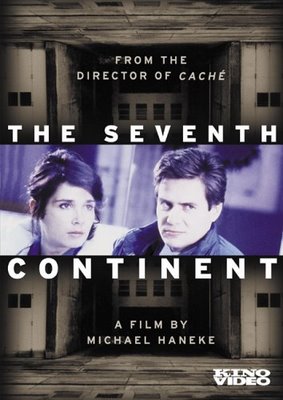Some Thoughts on The Seventh Continent

Tolstoy's Anna Karenina starts with what is perhaps the most famous opening sentence in a novel ever. It says, "happy families are all alike but every unhappy family is unhappy in its own way" (which is perhaps true not just for families but for individuals too). This is also the reason I generally give when people ask me why I avoid films which show happy people enjoying life, you know, beautiful young people falling in love or nice families with cute kids having fun etc. The reason is simple -- they just bore me to death. Unhappy people are far more interesting in an artistic sense, in the sense they are more complex in their psychological motivations and relationships with other people. They also generally have more interesting and less-obvious things to say about life and the world we live in.
What set me thinking along these lines was two movies that I saw in the past few weeks which must possibly be the two of the most feel-bad and uncompromisingly bleak films I have ever seen. The first was Robert Bresson's Mouchette in which a young girl's suicide feels like God's grace and the other was Michael Haneke's The Seventh Continent in which an ordinary bourgeois family's existential isolation and anomie grows so acute that they decide to destroy all their material possessions and then collectively take their own lives, along with their kid daughter. It is without doubt a masterpiece and obviously rests up there with the key modernist texts of European cinema, masterpieces by Antonioni, Bresson or Resnais. Just like those classic films, Haneke elevates form to the level of content, so that his use of cinematic devices, for example what he decides to put in background and what in foreground, how he stations and moves his camera, itself becomes more important than either the story, character, dialogues or the environment that they depict and as result the film speaks far more eloquently on the subjects than a conventional narrative could ever hope for.
Some of the things that he uses are narrative ellipsis and focus on the background (like in L'avventura) or the use of disjunctive and contrapuntal narration (like in Hiroshima mon Amour) or his relentless capturing of daily activities of the characters using a static camera which mysteriously achieves a complex meaning (just like Bresson's Pickpocket or A Man Escaped). Haneke in fact makes an obvious homage to Antonioni's Red Desert in a scene where the kid daughter fakes blindness in school (ostensibly in order to attract attention). In Red Desert Monica Vitti's son fakes a disablity in walking. Also there are dreamlike intermittent scenes of a tranquil beach (the seventh continent of the title) which hark back to the similar scene in the earlier Antonioni film.
What I like best about Haneke's films is not only its clarity of vision but also the way he distances himself from the hipster school of filmmaking which fetishizes violence and exults in the death of feeling and artificiality of the cinematic enterprise. He actually believes that cinema is connected to reality and it is not just a play of siginifiers, a manipulation of symbols which represent nothing but other artificial symbols. In this way his films become far more effective than the infantile provocations of, say, Gaspar Noe's Irrerversible, not to say anything about the ridiculous Kill Bill movies or that korean movie Oldboy, some of the few films which have triggered debate about the portrayal of violence in cinema in recent times and which are also some of the films, which are praised for being artificial.
Haneke's vision of contemporary life (the western bourgeois life to be specific) might be uncompromisingly bleak but his vision is also slightly heartening in the sense that they convincingly show that cinema can still do what it is supposed to do -- force the viewer out of comfortable and shallow certainties and make them question their priorities in life, question the ways they see themselves, people around them and the world in general.
Okay, I didn't say anything about the film in question but you can read about it here and here.
This promotional page of the film calls it "a better class of horror film". I completely agree. Also has this quote from Chicago Tribune review:
"THE SEVENTH CONTINENT is a calm chronical of hell...how commonplace people can erupt into despair or violence...Beautifully controlled, liberatingly intelligent it establishes Haneke as one of the more remarkable young contemporary filmmakers. The climactic half hour of this film ranks among the most truly terrifying in the modern cinema."
2 comments:
Very good post. Especially the reason why feel-good movies are monotonous and feel-bad versatile.
I am dying to see another one by Bresson. 'The Diary of a Country Priest' is spiritual in a devastating sort of way !
hehe! i was being tongue-in-cheek. I am sure there are happy people who are interesting too :)
Post a Comment